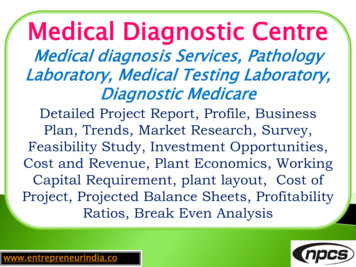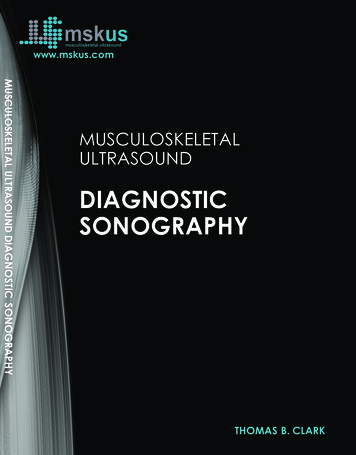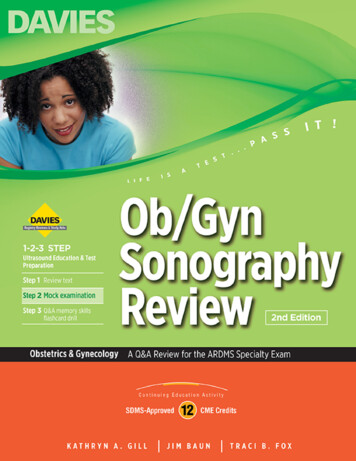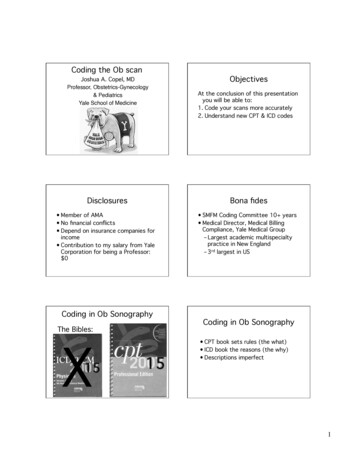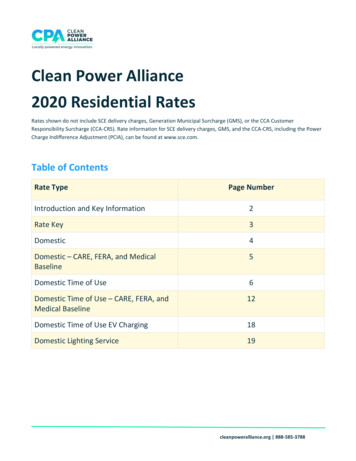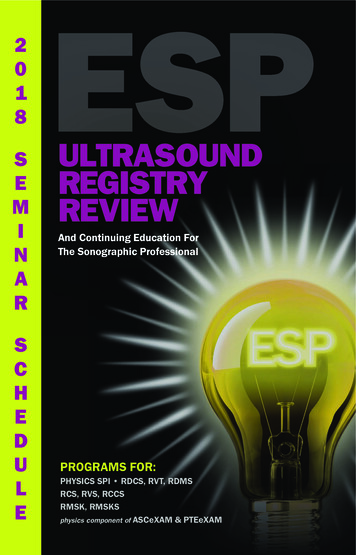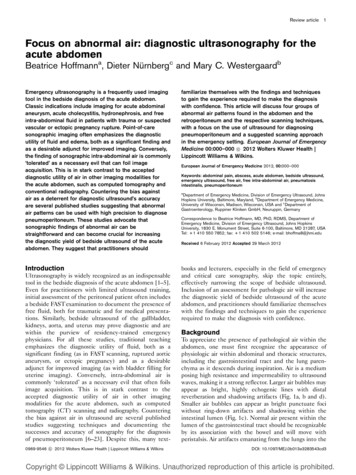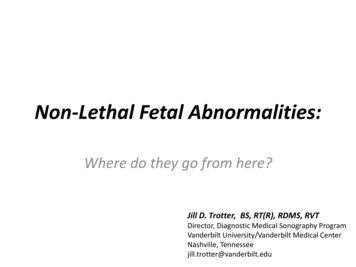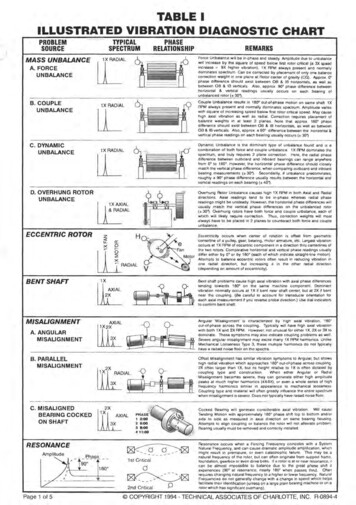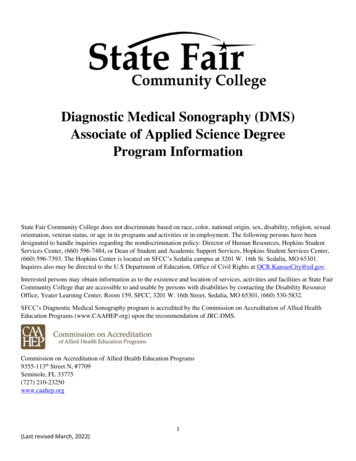
Transcription
Diagnostic Medical Sonography (DMS)Associate of Applied Science DegreeProgram InformationState Fair Community College does not discriminate based on race, color, national origin, sex, disability, religion, sexualorientation, veteran status, or age in its programs and activities or in employment. The following persons have beendesignated to handle inquiries regarding the nondiscrimination policy: Director of Human Resources, Hopkins StudentServices Center, (660) 596-7484, or Dean of Student and Academic Support Services, Hopkins Student Services Center,(660) 596-7393. The Hopkins Center is located on SFCC’s Sedalia campus at 3201 W. 16th St. Sedalia, MO 65301.Inquires also may be directed to the U.S Department of Education, Office of Civil Rights at OCR.KansasCity@ed.gov.Interested persons may obtain information as to the existence and location of services, activities and facilities at State FairCommunity College that are accessible to and usable by persons with disabilities by contacting the Disability ResourceOffice, Yeater Learning Center, Room 159, SFCC, 3201 W. 16th Street, Sedalia, MO 65301, (660) 530-5832.SFCC’s Diagnostic Medical Sonography program is accredited by the Commission on Accreditation of Allied HealthEducation Programs (www.CAAHEP.org) upon the recommendation of JRC-DMS.Commission on Accreditation of Allied Health Education Programs9355-113th Street N, #7709Seminole, FL 33775(727) 210-23250www.caahep.org1(Last revised March, 2022)
SFCC DMS Program FormatThe SFCC Sonography program is a 22 month competitive admission program which accepts applications byMarch 1 of each year for students who will begin that August. Students may apply to the Cardiac Track,General Track, or both, but may only accept admission to one track. All didactic (book work) courses arepresented in an online format. Students will complete laboratory hours on the SFCC Sedalia Campus andClinical hours in an assigned clinical site.DIAGNOSTIC MEDICAL SONOGRAPHY –ADMISSION PROCESSStudents are eligible to submit the program application packet when all prerequisite courses are complete or willbe complete by the end of the spring semester of the year in which they are applying, meet the EssentialQualifications for the Diagnostic Medical Sonography program, have a cumulative college GPA of 2.75 orgreater on a 4.0 scale, and have met the minimum grade requirement for each individual prerequisite course.GPA is checked at the end of the spring semester of the school year in which the student is applying. A newapplication packet must be submitted each year an applicant chooses to apply.Prior to applying for admission to the DMS program, students are strongly encouraged to contact theprogram’s Student Success Navigator, to help plan courses, clarify program requirements, and reviewstudents’ academic history. To schedule an appointment, call Fatima AhHee at (660) 596-7149 or emailfahhee@sfccmo.edu.In order to be considered for admission to the Diagnostic Medical Sonography program, applicants mustcomplete the following steps before March 1st of the year they wish to enter the program. (If currently onlyattending SFCC, skip step 1).1. Admission to State Fair Community College (SFCC)Submit an online SFCC Application for Admission at www.sfccmo.edu/admissions and meet all requirementsfor admission to SFCC. Students must be fully admitted to SFCC with all transcripts articulated.Students must submit official college transcripts from all colleges where credit was earned or attempted,including dual credit earned in high school.NOTE: Students who are completing prerequisites at colleges other than SFCC must request an officialtranscript to SFCC as soon as grades are posted after the end of the spring semester of the year in whichthe student is applying. Students who are currently enrolled in prerequisites at colleges other than SFCCduring the spring semester of which they are applying should provide unofficial transcripts with theDMS Application. It is the student’s responsibility to verify receipt of transcripts.2. Pre-Entrance Program ExamAll applicants must take a program pre-entrance exam called the ATI TEAS (Test of Essential Academic Skills)AH (Allied Health) exam prior to the application deadline of March 1st and earn a minimum overall score of65 or higher. Select ATI AH TEAS at testing center. Students are allowed to take this test an unlimitednumber of times. If a student chooses to take the exam more than once, the student must wait 45 calendar daysbetween testing dates. Student scores are valid for three application years; program application must bereceived before test results expire. SFCC administers the test on several campuses. For additional informationon registration and cost, please visit the SFCC Testing Center website vices/tests/ati-teas/ . If the test is completed2(Last revised March, 2022)
at a testing center other than SFCC, the student must request an official transcript from ATI. Official transcriptscan be purchased from the ATI online store at www.atitesting.com/ati store/. Unofficial ATI TEAS resultstaken from a testing center besides SFCC will not be accepted.The following links may prove helpful on the ttps://uniontestprep.com/teas3. Application for Admission FormComplete the Application for Admission Form found in the Application Packet located on the left hand sideof the SFCC Sonography webpage: -study/diagnosticmedical-sonography/ SFCC students may view their unofficial transcripts as a reference of their academichistory in mySFCC Academics Academic Profile.4. Applicant Observation Form(s)Students considering a career in diagnostic medical sonography can make a better-informed career decision iftheir choice is based on personal experiences or observation. All applicants must observe a minimum of 8hours in cardiac and 8 hours in general, for a total of 16 hours, regardless of the track or tracks they areapplying to. Up to 8 hours may be completed as a volunteer patient in the SFCC Scan Lab. To complete theprovided Applicant Observation Forms the supervising sonographer must complete and sign the form.Forms with missing signatures will not be accepted. Applicants should begin this process at least 3 monthsbefore the application deadline, as some facilities will not be able to accommodate requests on a short timeframe.Applicants must call and make an appointment with the director of radiology, ultrasound supervisor, leadsonographer, and/or human resources department regarding their observation. Many hospitals haverequirements for students to complete prior to observation time; it is the student’s responsibility to meetexpected requirements. Ask the facility for the expected dress code while observing (professional dress ormedical scrubs). No pierced jewelry shall be worn with the exception of one earring per earlobe. Overallappearance should be clean and neat. A professional appearance inspires confidence in the patient.It is recommended that students observe in more than one clinical setting. If the diagnostic imaging departmentis not busy on the day of the observation, the applicant is strongly encouraged to schedule an additionalobservation. The applicant is responsible for documenting all additional observation hours. A separate formshould be used for each clinical visit.Contact Clinical Coordinator Maddie Stephan at mstephan@sfccmo.edu to arrange SFCC Scanning Labobservation hours. Please specify if you are needing Cardiac or General Lab Observation hours.5. EssayPlease use the following instructions as you prepare your admission essay:Submit a 2-page typed essay with your SFCC student ID# in the top left-hand corner. Your name should not be usedanywhere in the essay. The Essay should be double spaced, use 12- point Times New Roman font, and have 1-inchmargins. The essay should utilize correct grammar, medical terminology, punctuation, and spelling.3(Last revised March, 2022)
The essay should include, but is not limited to, the following:1. Motivation for pursuing this health science career (Should include discussion of your observation or observationalternative experience.)2. Strategy for successfully completing a rigorous full-time health science program requiring an obligation of at least 40hours each week. (Components of success include managing personal and family challenges, time management,school/work balance, transportation, and financial commitments.)3. Career/professional goals post-graduationThe essay is an important component of the application process as many of the program classes include writtenassignments; therefore, strong writing and communication skills are important. Communication is extremely important forhealthcare professionals because they must be able to communicate with patients as well as other members of their teamsuch as technologists, radiologists, and nurses.Applicants are encouraged to utilize the Academic Success Center. Students may send their papers to the tutors via email.Tutor contact information may be found at: https://sfccmo.libguides.com/c.php?g 343723&p 3937281The tutors may not be able to help with your sonography related wording, but they would be able to help with writingmechanics, such as critical thinking, organization, and professionalism, as well as sentence structure, grammar, spelling,and clarity.6. Application SubmissionSubmit the required items (#3-5 above) in one large envelope and submit to the Diagnostic Medical SonographyDepartment prior to the application deadline. Be sure to follow instructions on all forms. All applicationmaterials must be received and articulated in the Diagnostic Medical Sonography Department by 3:00 pm onMarch 1st or the first business day of March.Late application materials will NOT be accepted. After March 1, all complete applications will be evaluated.All materials submitted are considered privileged and are not available for students to view. Allincomplete packets will be considered ineligible. Any missing signatures will disqualify packets.Contact the following program personnel if you have questions about the application or admissions process:Alice Kiburz-Townsend, Program Director(660) 596-7420atownsend2@sfccmo.eduMadlyn Stephan, Assistant Program Director(660) 596-7418mstephan@sfccmo.eduFatima AhHee, Student Success Navigator(660) 596-7149fahhee@sfccmo.edu4(Last revised March, 2022)
Program PrerequisitesAll prerequisite courses must be completed by the end of the spring semester in which the student is applying. Additionalprerequisite course work may be required based on placement exams. Students who are completing prerequisites atcolleges other than SFCC must request an official transcript to SFCC as soon as grades are posted after the end of thespring semester of the year in which the student is applying. Students who are currently enrolled in prerequisites atcolleges other than SFCC during the spring semester of which they are applying should provide unofficial transcripts withthe Sonography Application. It is the student’s responsibility to verify receipt of transcripts.PrerequisitesCredit HoursGrade RequirementPHYS 105 College Physics I with Lab (or)RAD 130 Radiographic Productions and Characteristics (onlyavailable to students who have completed a radiologictechnology program)3-5C or higherENGL 101 English Composition I3B or higherMATH 113, 114, 119 or higher3B or higherHEOC 120 Medical Terminology3B or higherBIO 207 Human Anatomy with Lab4B or higherBIO 208 Human Physiology with Lab4B or higherHIST 101 U.S. History Before 1877 (or)HIST 102 U.S. History Since 1877 (or)POLS 101 American/National Government3B or higherENGL 102 English Composition II (or)COMM 101 Public Speaking3B or higher***Must earn the minimum required grade for each prerequisite course***Must have an overall cumulative GPA of 2.75 or higher for all college coursework.NOTE: If a student has taken an Anatomy and Physiology I (A/P) (4 credit hours) or Anatomy and PhysiologyII course (A/P) (4 credit hours) from an accredited higher education institution, this does not satisfy therequirements of either Anatomy or Physiology courses that are required by this program. If a student’stranscript indicates BOTH A/P I AND A/P II courses with a “B” or higher, this will satisfy the Anatomy andPhysiology requirements of this program. If a student takes A/P I and A/P II and one of the grades for these arelower than a “B”, the student must repeat that course or take SFCC’s separate Anatomy and Physiology courses.All required (including prerequisites for the program) science courses must meet the requirement of havingbeen completed within the last 10 years at the time of application to the State Fair Community CollegeDiagnostic Medical Sonography program.Students with DisabilitiesStudents with documented disabilities who are applying for admission to State Fair Community College’s5(Last revised March, 2022)
Diagnostic Medical Sonography Program are welcome according to guidelines of the Americans withDisabilities Act (ADA) of 1990. Reasonable accommodations will be made for students with documenteddisabilities, who have the abilities to assume the role and meet expected educational outcomes as required forall students seeking the Associate of Applied Science in Diagnostic Medical Sonography degree. These abilitiesare outlined in the Essential Qualifications for the Diagnostic Medical Sonography Program.Essential Qualifications for the Diagnostic Medical Sonography ProgramThe following essential qualifications address the physical, cognitive, attitudinal and behavioral abilitiesessential to this program. Students must meet these essential qualifications in order to be admitted and retainedin the program. Students are required to meet the standards with or without reasonable accommodations.Students with documented disabilities who wish to request reasonable accommodations under the Americanwith Disabilities Act must follow the college’s procedure for requesting accommodations. The college reservesthe right to reject requests for accommodations that would fundamentally alter the nature of an educationalprogram, lower the academic standards, cause an undue hardship on the college, or endanger the health or safetyof a student with a disability, other students, clinic patients, or any other member of the college community.State Fair Community College (SFCC) Associate of Applied Science Degree in Diagnostic MedicalSonography certifies that the holder of that degree has been educated to competently enter practice as aDiagnostic Medical Sonographer, having demonstrated competency in cognitive, affective, and psychomotordomains. Both professional coursework and general education requirements contribute to the development andcompletion of these competencies. To be eligible to sit for the American Registry of Diagnostic MedicalSonographers’ certifying examination, all components of the degree program must be completed. In order tosuccessfully complete these competencies and to ensure the health and safety of patients, fellow candidates,faculty, and other health care providers, the abilities listed on the following pages are required. Theserequirements are consistent with the employment requirements of our clinical education sites. Each person whocompletes a letter of recommendation form will also be evaluating the applicant’s ability to meet the EssentialQualifications, and one or more concerns from the person completing the recommendation form may result inthe student not being accepted to the program.Motor SkillsCandidates should have sufficient motor function so that they are able to execute movements required toprovide general care and examination to patients in all diagnostic imaging settings. In general, this requirescandidates to be able to regularly lift at least 25-100 pounds (in assisting in patient transfers); stand/walk 6-7hours per 8 hour shift with prolonged standing; bend, stoop and twist repetitively, lasting several minutes eachtime, carry up to 20 pounds, move carts weighing 200 lbs., and reach a height of 6 feet to activate emergencycall buttons and reach equipment. Fine and gross motor movement of the upper extremities is required in all ofthe above.SensoryCandidates must be able to observe a patient accurately, align the transducer with the body parts to be imaged,and observe and appreciate both verbal and non-verbal communications when performing diagnostic imagingstudies. Candidates should have normal functional vision with corrective eyewear. Candidates should haveauditory ability sufficient for physical monitoring and assessment of client health needs, which includes hearingfaint body sounds, faint voices, hearing and assessing minute changes in pitch, hearing situations when not ableto see lips, and hearing auditory alarms with or without auxiliary aids.6(Last revised March, 2022)
Behavioral/EmotionalCandidates must have emotional stability in order to approach situations and apply critical thinking skills in asystematic and professional manner. They must be capable of exercising good judgment and promptlycompleting the responsibilities involved in the examination and care of patients. Candidates must communicateeffectively and sensitively with other students, faculty, staff, patients, family, and other professionals.Candidates must be able to deal effectively with the stresses encountered in nearly 40 hours of class work perweek in addition to family and life demands. They must express their ideas and feelings clearly and demonstratea willingness and ability to give and receive feedback.CommunicationCandidates must be able to effectively explain diagnostic imaging procedures to both the patient and familymembers, utilize questioning techniques to obtain accurate clinical histories, and give directions during thestudy. Candidates must be able to communicate orally and in writing with individuals of all backgrounds andeducational levels.CognitiveCandidates must be able to measure, calculate, reason, analyze, integrate and synthesize in the context ofundergraduate Diagnostic Medical Sonography education. Candidates must be able to quickly read andcomprehend extensive written material. They must also be able to recall, evaluate, and apply information andengage in critical thinking in the classroom and clinical setting.Professional ConductCandidates must possess the ability to reason morally and practice Diagnostic Medical Sonography in an ethicalmanner. Candidates must be willing to learn and abide by professional practice standards. They must possessthe attributes that include compassion, empathy, integrity, honesty, responsibility and tolerance. Candidatesmust be able to engage in examination and patient care delivery in all settings and be able to deliver care to allpatient populations including but not limited to children, adolescents, adults, developmentally disabled persons,medically compromised patients and vulnerable adults. Candidates who are selected for the program must passa criminal background check as required by our clinical education sites.While these abilities are required to successfully complete the competencies leading to the Associate of AppliedScience in Diagnostic Medical Sonography degree, successful completion of the requirements for a degree doesnot guarantee eligibility to take the American Registry for Diagnostic Medical Sonography or the AmericanRegistry for Radiologic Technologists Certifying exams. Eligibility for examination requires that the candidatebe of good moral character. Conviction of a misdemeanor or felony may indicate a lack of good moral characterfor ARDMS/ARRT purposes. The ARDMS and ARRT Ethics Committees conduct a thorough review of allconvictions. Documentation required for a review includes written personal explanation of the activity and courtrecords to verify the conviction, sentence, and completion of the sentence.It is important that the candidate understand there is a moral character requirement for eligibility forexamination. Anything less than complete and total disclosure of any and all convictions will be considered ashaving provided false or misleading information to the ARDMS/ARRT. This is grounds for permanent denial ofeligibility for certification. The ARDMS and the ARRT may conduct criminal background searches wheneverappropriate. If you have concerns regarding your eligibility to sit for the ARDMS or ARRT examinations,please contact the ARDMS at:7(Last revised March, 2022)
American Registry for Diagnostic Medical Sonography1401 Rockville Pike, Suite 600 Rockville, MD 20852-1402Tel: (301) 738-8401 or (800)-541-9754 Fax: (301) 738-0312Or the ARRT at:The American Registry of Radiologic Technologists1255 Northland Drive St. Paul, MN 55120Tel: (651) 687-0048Or CCI at:Cardiovascular Credentialing International1500 Sunday Drive, Suite 102 Raleigh, NC 27607Phone: (800) 326-0268 Fax: (919) 787-4916DIAGNOSTIC MEDICAL SONOGRAPHY PROGRAM INFORMATIONGraduates of SFCC’s Diagnostic Medical Sonography Program will earn an Associate of Applied Sciencedegree in Diagnostic Medical Sonography. Through classroom theory, laboratory practice and clinicalapplication, students learn to safely use ultrasound in the diagnosis of trauma and disease. Students areintroduced to the vast opportunities in diagnostic medical sonography and achieve entry-level competency inthe performance and evaluation of ultrasound examinations and procedures.Institution AccreditationState Fair Community College has been affiliated with the North Central Association (NCA) of Colleges andSchools since it was founded. Correspondence status was granted in 1968. Full accreditation was granted in1976, 1981, 1988, and 1999. SFCC became accredited through admission to the NCA Higher LearningCommission's Academic Quality Improvement Program (AQIP) in August 2005 and continues to be accreditedon an annual basis. The Higher Learning Commission can be contacted through the following:The Higher Learning Commission230 South LaSalle Street, Suite 7-500Chicago, Illinois 60604-1411Phone: 800.621.7440 or 312.263.0456 Fax: 312.263.7462HLC website: http://ncahlc.org/ HLC Email: info@hlcommission.orgComplaints or concerns about an Institution affiliated with the Commission can be sent to:complaints@hlcommission.orgProgram AccreditationSFCC’s Diagnostic Medical Sonography program is accredited by the Commission on Accreditation of AlliedHealth Education Programs (www.CAAHEP.org) upon the recommendation of JRC-DMS.Commission on Accreditation of Allied Health Education Programs9355-113th Street N, #7709, Seminole, FL 33775(727) 210-23250www.caahep.org8(Last revised March, 2022)
Program MissionThe Diagnostic Medical Sonography program provides educational opportunities for students to developknowledge, skills, and attitudes conducive to the challenges within the field of sonography. Experiencesprepare students in a variety of settings to practice effectively with clients with diverse health needs across thelife span.Program VisionThe vison of the State Fair Community College Diagnostic Medical Sonography program is to prepare theindividual for an entry-level position as a professional medical sonographer. The DMS program envisions acontinuance and advancement in the use of technology within the classroom Within the stimulating collegeenvironment, the student will be afforded the opportunity to achieve educational and personal growth goalswhile developing the technical skills necessary for success as a professional medical sonographer. This programprepares the student to implement sonographic procedures, ultrasound physics, image orientation and evaluationof diagnostic sonographic images. These procedures are conducted in a caring, safe, effective, and legalmanner. The program will prepare students to work effectively with other health care professionals, patients,and families to promote patient diagnosis and recovery. The program will continue to serve the community andthe surrounding areas.Program GoalsStudent Learning Goals:Goal #1- Clinical Competence Students will possess the skills, knowledge and judgment to practice competently, ethically and legally. Students will develop workforce readiness skills so that students routinely provide accurate technicalimpressions, both orally and in written reports, to the interpreting physician.Goal #2- Proficient Critical Thinking Students are capable of evidence-based decision making and critical thinking Prepare each student to function as an effective member of the health care team by providing qualitypatient care. Prepare each student to develop entry-level professional skills as a Diagnostic Medical Sonographer toprovide accurate information to the interpreting physician.Goal #3- Effective Communications Students will develop effective oral communication skills. Students will possess abilities to communicate effectively to patients and all members of the care team. The development of the interpersonal skills necessary to care effectively for patients and dealings withother members of the health care delivery team is of utmost importance.Goal #4 – Involved Professionalism Students are engaged in community and professional service. Students are committed to life-long learning. Students will demonstrate professional behavior. Each student will be prepared with entry-level professional skills as a Diagnostic Medical Sonographerto treat staff and patients in a respectful manner by following institutional code of conduct and ethics.9(Last revised March, 2022)
Program Minimum Expectations(according to CAAHEP Standards and Guidelines for the Accreditation ofEducational Programs in Diagnostic Medical Sonography) "To prepare competent entry-level Abdomen-extended sonographers in the cognitive (knowledge),psychomotor (skills), and affective (behavior) learning domains""To prepare competent entry-level OB/GYN sonographers in the cognitive (knowledge), psychomotor(skills), and affective (behavior) learning domains"“To prepare competent entry-level vascular technologists in the cognitive (knowledge),psychomotor (skills), and affective (behavior) learning domains.”“To prepare competent entry-level cardiac sonographers in the cognitive (knowledge), psychomotor(skills), and affective, (behavior) learning domains.”Graduate Learning OutcomesState Fair Community College Diagnostic Medical Sonography program will provide a positive educationalatmosphere in which to prepare Diagnostic Medical Sonographers who as graduates will be able to: Successfully attain skills necessary for entry-level positions as a registered Diagnostic MedicalSonographerMaintain high ethical standards in the provision of health careProvide evidence-based, patient centered care to a diverse population in a variety of settingsUtilize critical thinking skills that will enable self-evaluation and the pursuit of lifelong learningEngage in professional association activities“The graduate will have the ability to provide patient services in a variety of medical settings in which thephysician is responsible for the use and interpretation of ultrasound procedures. In assisting physicians ingathering sonographic data, the graduate will be able to obtain, review, and integrate pertinent patient historyand supporting clinical data to facilitate optimum diagnostic results; perform appropriate procedures and recordanatomical, pathological, and/or physiological data for interpretation by a physician; record and processsonographic data and other pertinent observations made during the procedure for presentation to the interpretingphysician; exercise discretion and judgment in the performance of sonographic services; provide patienteducation related to medical ultrasound; and promote principles of good health” (according to CAAHEPStandards and Guidelines for the Accreditation of Educational Programs in Diagnostic Medical Sonography).The following is information about some of the policies for the program.10(Last revised March, 2022)
Background Check (required)State Fair Community CollegeBackground Check PolicyHealth Science ProgramsThe Joint Commission of Accreditation of Healthcare Organization (JCAHO), which accredits healthcarefacilities across the country, enforced background screening September 2004 and has set requirementsmandating that students in a healthcare field must now complete the same background check as hospitalemployees.As required by clinical facilities contracted by State Fair Community College, all Health Science programstudents that are enrolled in a clinical course must submit to a criminal background check from the state orstates in which they have resided over the past year.Students are responsible for the payment of their background investigation, and CastleBranch must conductthe investigation.All background checks will be evaluated according to the exclusionary criteria of the contracted clinicalfacilities. Failure to complete a background check will prohibit student from participating in clinical educationand admission to all State Fair Community College Health Science programs.Students with criminal histories who desire licensure or registration in Health Science Professions are urged toconsult the laws governing licensure or certification in the state they intend to license/certify prior toapplication to the respective health science program.The following searches are required for students attending facilities for clinical through State Fair CommunityCollege:1. Missouri Statewide Criminal History Record Search2. Federal Criminal History Record Search3. Social Security Number Trace (residential history, state and date issued)4. National Sex Offender Registry5. Office of Inspector General Sanction Repo
MATH 113, 114, 119 or higher 3 B or higher HEOC 120 Medical Terminology 3 B or higher BIO 207 Human Anatomy with Lab 4 B or higher BIO 208 Human Physiology with Lab 4 B or higher HIST 101 U.S. History Before 1877 (or) HIST 102 U.S. History Since 1877 (or) POLS 101 American/National Government 3 B or higher
